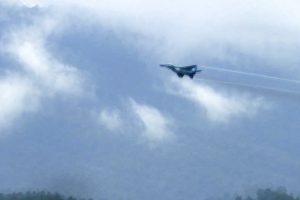Sribala Subramanian

On January 11, military jets conducted an air raid on a small settlement along Myanmar’s western border. The attack on Camp Victoria damaged a clinic, clearly marked with a red cross sign on the roof indicating a protected facility. Photos posted on social media show medical supplies spilling out of a structure whose corrugated metal walls had crumpled under the impact of the blast.
There were no injuries, but about 250 people fled across the border to the Indian state of Mizoram. “We didn’t think that such an inhuman act as a bomb blast on a civil hospital would happen,” said a doctor involved with the clinic. According to media reports, five fighter jets carried out the bombings over two days.
Why is Myanmar’s military attacking civilian targets?
The strike on Camp Victoria, located in Chin State, was the latest in a series of devastating air attacks across the country. Last September, children in a school compound in central Myanmar were mowed down by bullets fired from combat helicopters. A month later, an aerial attack on a concert in Kachin State killed 80 people. Myanmar’s government in exile, or NUG (National Unity Government), claims that of the 268 airstrikes carried out between October 2021 and September 2022, more than 70 percent targeted civilians. “There are not many countries that opt to employ their air power against their own citizens,” observed an Indian defense analyst.
Bombing civilians is one way the military implements its “four cuts” counterinsurgency strategy, which aims to sever bonds between ethnic armed groups and the communities that support them with food, funds, and recruits. Shona Loong, a lecturer at the University of Zurich who studies armed resistance movements in Myanmar, explained in an interview with Al Jazeera: “The recent airstrikes still testify to the military’s view of Chin resistance forces as ‘terrorists’ that must be crushed, even if doing so incurs a significant civilian toll.” Guerilla tactics employed by Chin fighters and other armed groups have reportedly inflicted severe casualties on infantry units leading Myanmar’s generals to shift their focus to air attacks.
Communities like Camp Victoria contain a mixed population of combatants and civilians. Nestled in a valley surrounded by low hills, the settlement serves as the headquarters of the Chin National Army, the military arm of the Chin National Front, which is fighting for greater autonomy at the state level. However, Camp Victoria also serves as a hub for the local community, providing services such as schools, medical facilities, and churches.
The bombed clinic has served more than 5,000 people since it opened in August 2021. An intelligence leak last November revealed that the building was on a list of 14 locations targeted by the military. A deliberate attack on a medical facility would be considered a war crime under the rules of the Geneva Convention.
The Camp Victoria bombings got a fair bit of media attention because the debris field was an international border. Shrapnel rained down near the Indian village of Farkawn, damaging the windshield of a truck used for loading sand. In a statement, the Mizoram-based Young Mizo Association condemned the attack by Myanmar’s fighter jets for “terrifying” farmers and sand loaders who worked near the border. Mizo vlogger Vanneihthanga Vanchhawng traced the path of the planes, which he believes “flew right in Indian air.” In a report, the human rights NGO Myanmar Witness concluded that the evidence points to an “almost certain” violation of India’s airspace.
After the Camp Victoria attack, NUG’s Ministry of Foreign Affairs called on neighboring countries to block their air space to prevent future incursions. They pointed out that it was not the first time in recent months that Myanmar’s combat aircraft had breached an international border. Last year, both Bangladesh and Thailand protested air space violations. Thailand dispatched F-16 fighter jets in response and evacuated schoolchildren from the area.
The scale and brutality of the attacks against civilians have pushed some Western nations to impose tougher sanctions. Last month, Canada and the United Kingdom introduced new curbs on the sale of aviation fuel to Myanmar.
No comments:
Post a Comment